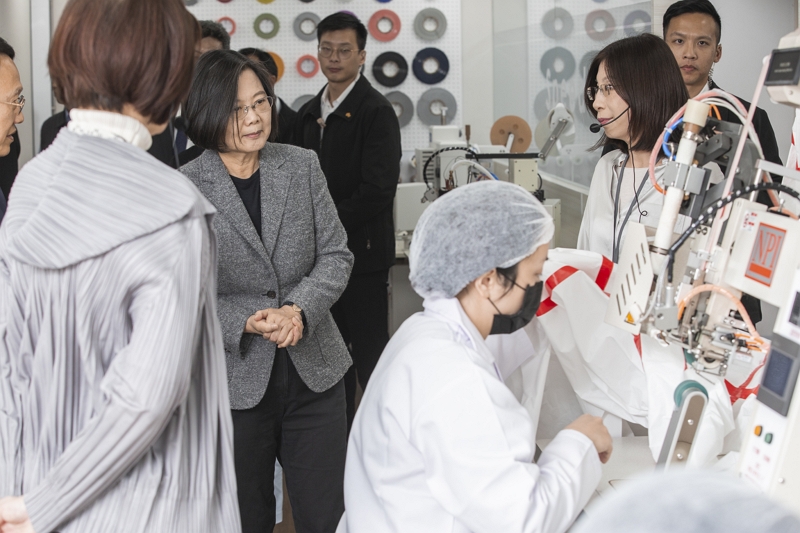According to an article by Stanford’s Freeman Spogli Institute for International Studies, Taiwan has managed to prevent the coronavirus from heavily impacting its 23 million citizens due to using tech such as big data analytics to generate real-time alerts from the integration of health insurance data base with its immigration and customs database, as well as putting into place a robust pandemic prevention plan at the 2003 SARS outbreak.
As of 19 April, the Taiwan Centers for Disease Control (CDC) reported a cumulative total of 420 confirmed cases of COVID-19 infections with 6-related deaths. Linkou Chang Gung Memorial Hospital, which is part of the Chang Gung Medical Foundation, is located in Guishan District, Taoyuan City, has nearly 4000 beds and is one of the largest hospitals in terms of hospital beds.
Healthcare IT News spoke to Prof. Chyong-Huey Lai, Vice-superintendent of Chang Gung Memorial Hospital, Linkuo Branch to learn about how the hospital prepared itself to cope with COVID-19 cases.
Could you tell us more about your role at Chang Gung Memorial Hospital (CGMH)?
I am a gynecologic oncologist, therefore I have to oversee the Department of Obstetrics and Gynecology for their practice, research, and teaching activities. I am also responsible for the overseeing of the activities of Departments of Pathology, Laboratory Medicine, Nuclear Medicine, Radiology, and Radiation Oncology. During COVID-19 crisis, I have to communicate with Epidemic Prevention Center of CGMH and those departments to ensure that the hospital policies are executed. I chair the Oncology Committee, Employee Health Promotion Committee, Protocol Review Committee of the hospital.
I am very proud that our LDT for SARS-CoV2 nucleic acid test from our Department of Laboratory Medicine is one of the best in Taiwan.
On the ground level, how has CGMH prepared itself to handle COVID-19 cases? What were the key lessons learnt?
CGMH, Linkou Branch has treated 17 COVID-19 patients so far. We had 2-level of setting for taking care of the COVID-19 confirmed or suspected cases. For caring patients in Quarantine wards (suspected cases) and Isolation wards (confirmed cases), strict “universal precaution” should be followed. At present, the ER/infectious specialist/pulmonologists are the first line MDs taking care of COVID-19 patients.
Other internal medicine MD, surgeon and other specialists are second line. All of them need to be trained for the diagnosis and treatment for COVID-19, critical care and rehearsal of (Personal Protection Equipments) PPEs put on/take off.
From a health IT and technologies perspective, what were some of the key technologies, applications and tools that were crucial in tackling COVID-19 cases?
Health IT and technologies including the internet of things (IoT) with next generation telecommunication networks (e.g., 5G), big-data analysis; artificial intelligence (AI), and blockchain technology will be important in tackling COVID-19 cases.
How has CGMH worked with the national health authority (Ministry of Health and Welfare, MOHW) in the containment of the COVID-19 situation in Taiwan?
CGMH implemented an enhanced traffic control bundling (eTCB) and patient risk stratification strategy: (1) triage prior to entering hospitals, (2) strict separation among zones of risk, and (3) strict requirements and protocols for PPE use coupled with checkpoint hand disinfection. All employees need to report their body temperature and health condition daily.
All employers need to report their Travel, Occupation, Contact, and Cluster (TOCC) weekly, including contact history with anyone who recently came back from overseas. If an employer reports any symptom, she/he will be requested to go to outpatient clinic (ID) or epidemic clinic, depending on the history, job characteristics, and severity, she/he may be screened for SARS-CoV-2 and may be given only symptomatic treatment. If screened, she/he must return home pending the result. All these employers have to stay at home without going outside, report their condition to their superior, and may return to work after recovery (when screened negative).
CGMH has a COVID-19 response consensus meeting every other day to extract the world update on COVID-19, the daily announcements from MOHW, and the hospital COVID-19 cases update.
What would you say are the key ingredients in Taiwan’s effective containment of spread of the COVID-19?
Taiwan’s effective containment of spread of the COVID-19 is based on preparedness of the government level, hospital level and the population level.
Government level: (1) early border control: ban visitors from high risk areas and citizens are quarantined 14 days after coming back from high risk areas;
(2) Taiwan used its national health insurance database and integrated it with its immigration database to check the individual status for the hospital to alert and stratify;
(3) proactive case contacts surveillance: case finding and containment – test, isolation, and quarantine;
(4) resource allocation: national level promoting mask, PPE production early on, setting price, limit purchase of important health equipment, government/military personnel support;
(5) reassurance and education of the public through daily press briefing, travel risk advisory, wearing of masks and hand hygiene.
Hospital Level: For example, other hospitals have their own strategy similar to what CGMH is practicing, and this is why we did not have nosocomial spread till now.
Population level: Taiwanese people are highly alert on what is new of COVID-19 pandemic. We wear face masks in the public, keep social distancing, wash our hands frequently, and listen to the MOHW press conference every day.
What do you think will be main changes/impact on digital health in Taiwan post COVID-19?
The current way of tracing the quarantines in Taiwan is relying on the two-way communication of the quarantined individual, monitoring from the CDC and honesty of the quarantined individual to report his or her health parameters on the App. A wearable device to track real-time data from the quarantined individual and integrating them into an AI interpretation system to make timely call backs is necessary if the pandemic could not be controlled in summer in the world.

































